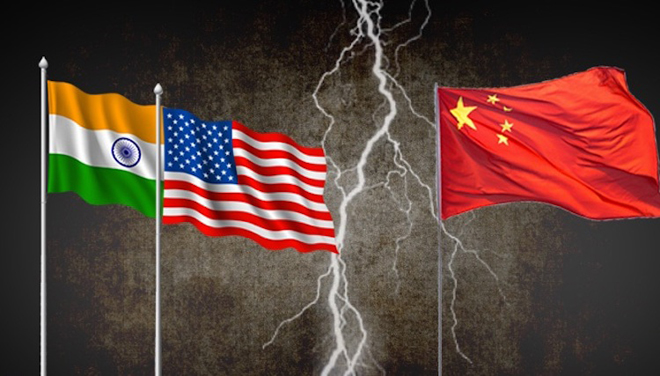News Time
The US is making India an ally against China as part of its military strategy. The United States sees China as an emerging rival, while China sees the United States as a threat. As long as China feels threatened by the US, the region will remain under pressure. The possibility of border tensions turning into a nuclear confrontation is slim. Due to China’s military superiority, India will not be able to take ground action against it. The South Asian environment could change rapidly, leading to dangerous tensions as a result of miscalculations. The world as a whole is facing uncertainty, unpredictability and instability. These views were expressed by Rahul Roy Chaudhry, Senior Fellow for South Asia, International Institute of Strategic Studies, Dr. Tong Dao, Senior Fellow Carnegie Center for Global Policy (Beijing), Michael Kogelman, Deputy Director and Senior Fellow, Woodrow Wilson Center, Washington. DC, Lt. Gen. (Retd.) Ashfaq Nadeem Ahmed, Former Chief of General Staff and Air Chief Marshal (Retd.) Kaleem Saadat Nechin, India Border Clashes, he was addressing an international seminar organized by the Center for Aerospace and Security Studies in Islamabad on the impact of South Asia on the strategic environment. The seminar was hosted by Syed Muhammad Ali, Director, Nuclear Policy and Strategy.
Rahul Rai Chaudhry said that the recent Sino-Indian border tensions have soured relations between the two countries. The growing focus on defense policy is not without risks to India. Dr. Tongdao said that there is a sharp difference of feeling between China and India. China believes that India has tried to change the situation in the region by abolishing the special status of Jammu and Kashmir and making Aksai Chin a part of Jammu and Kashmir. Such moves by India have also mobilized Chinese forces to defend the country’s national security. India, on the other hand, felt that China was changing the border region. He said that despite the efforts of both the countries, a speedy resolution of the dispute was not possible. Deputy Director and Senior Fellow, Woodrow Wilson Center, Washington DC, said the Ladakh tensions have exacerbated India’s diplomatic problems and escalated its hostility to Pakistan and China. The South Asian environment could change rapidly, leading to dangerous tensions as a result of miscalculations.
Both Delhi and Islamabad are concerned that the other country will not use the Ladakh tension to its detriment. Kogelman said that although many US leaders have criticized China during the Ladakh tensions, however, Biden’s US administration may reconsider possible cooperation with China and its Indo-Pacific strategy. Lt. Gen. (retd) Ashfaq Nadeem Ahmed said the region’s development depends on reducing regional conflicts and its relationship with the United States. He said the United States sees China as an emerging rival while China sees the United States as a threat. As long as China continues to feel threatened by the US, the region will remain under pressure. He said that among many other consequences, the psychological impact of the Ladakh conflict on all the important countries of the region could not be ignored. This dispute has proved that China is capable of defeating India in a lower level dispute. However, the two countries will not escalate tensions in Ladakh given the $90 billion bilateral trade.




